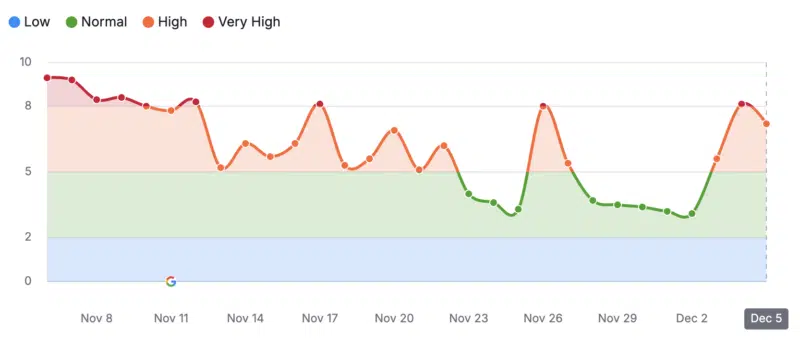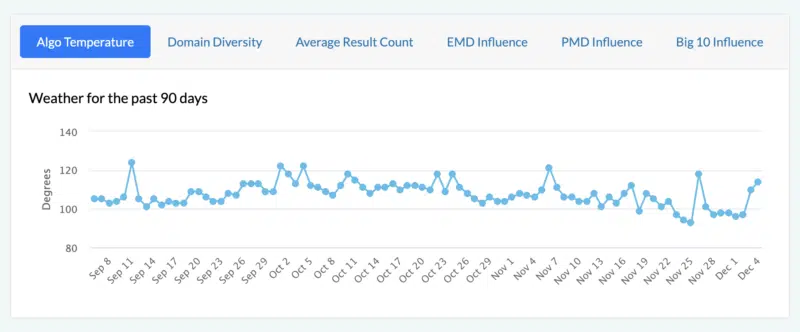Google’s November 2024 core update is now done rolling out, a Google spokesperson told us. It started on November 11, 2024 and completed about 24 days later on December 5, 2024. This update was a typical core update where Google updates its core ranking system to make search results more relevant and helpful.
What Google said. Google said about this core update:
“This update is designed to continue our work to improve the quality of our search results by showing more content that people find genuinely useful and less content that feels like it was made just to perform well on Search.”
What we saw. Based on what I’ve been tracking, this update started to be felt a couple of days after it was announced on November 13th and 14th, and then seemed to hit a wider set of sites this past weekend, around November 16th and 17th. Towards the end of this update, many of the tracking tools showed relatively low ranking volatility but then we saw a large spike in volatility around November 25th and 26th. We even saw significant movement over the past few days, in early December. We thought this update would be done before the Black Friday shopping season, but it was not completed beforehand and well into the following week.
Here are some charts showing the volatility over this update:




This does not seem to be the largest Google core update, Google said the March 2024 core update was that. But this was indeed a core update and if your site was affected by this update, it would have seen big swings in its search rankings in Google..
Previous communication. Google told us weeks ago that an update was coming soon but websites negatively impacted by the September 2023 helpful content update should not expect to see big recoveries. It is too soon to know what type of impact this November core update will have.
What to do if you are hit. Google has given advice on what to consider if you are negatively impacted by a core update in the past. Google has not really given much new advice here but here is the past advice the company provided:
- There aren’t specific actions to take to recover. A negative rankings impact may not signal anything is wrong with your pages.
- Google has offered a list of questions to consider if your site is hit by a core update.
- Google said you can see a bit of a recovery between core updates but the biggest change would be after another core update.
In short, write helpful content for people and not to rank in search engines.
- “There’s nothing new or special that creators need to do for this update as long as they’ve been making satisfying content meant for people. For those that might not be ranking as well, we strongly encourage reading our creating helpful, reliable, people-first content help page,” Google said previously.
For more details on Google core updates, you can read Google’s documentation.
Previous core updates. The first core update of 2024 – the March 2024 core update – was the largest core update ever, according to Google. It started March 5 and completed 45 days later on April 19. The second core update was the August 2024 core update was on August 15th, and completed 19 days later on Sept. 3.
Here’s a timeline and our coverage of recent core updates:
- The August 2024 core update was on Aug. 15 and ended on Sept. 3.
- The March 2024 core update was on March 5 and ended on April 19.
- The November 2023 core update was on Nov. 2 and ended on Nov. 28.
- The October 2023 core update was on Oct. 5 and ended on Oct. 19
- The August 2023 core update was on Aug. 22 and ended Sept. 7.
- The March 2023 core update was on March 15 and ended March 28.
Why we care. Now that his November 2024 core update is done, you can start to dig in to see how you are your clients were impacted. You can reviews Google’s guidance and apply your SEO knowledge to try to continue to improve your site and Google rankings.
Google releases core update every few to several months, so you should always continue to work on improving your site and the content on your site. Future updates may benefit your site’s ranking and Google traffic – so always be working on improvements – not just for Google Search but also for your website users.
Comments